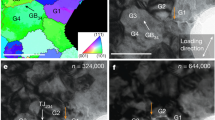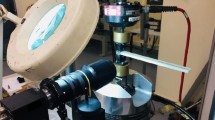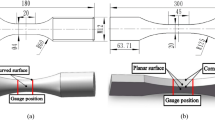Abstract
THE question of whether or not residual stresses have any significant effect on fatigue strength has been the subject of much research for some time. However, in 1956 Puchner1 showed that a large increase in the fatigue strength of specimens containing discontinuous longitudinal welds could be obtained by heating the specimen locally with an oxyacetylene torch, in such a way as to introduce residual compressive stresses at the site of the most dangerous notch from the point of view of fatigue failure (namely, at the ends of the welds). His results have been confirmed by recent work of the British Welding Research Association. In view of the potential practical importance of these results, it was decided to carry out an exploratory programme of tests to determine the effect of inducing residual stresses by mechanical means.
This is a preview of subscription content, access via your institution
Access options
Subscribe to this journal
Receive 51 print issues and online access
$199.00 per year
only $3.90 per issue
Buy this article
- Purchase on Springer Link
- Instant access to full article PDF
Prices may be subject to local taxes which are calculated during checkout
Similar content being viewed by others
References
Puchner, O., Schweisstechnik, 6, No. 4 (1956).
Author information
Authors and Affiliations
Rights and permissions
About this article
Cite this article
GURNEY, T. Improvement of the Fatigue Strength of Notched Specimens by artificially induced Residual Stresses. Nature 183, 883–884 (1959). https://doi.org/10.1038/183883a0
Issue Date:
DOI: https://doi.org/10.1038/183883a0
Comments
By submitting a comment you agree to abide by our Terms and Community Guidelines. If you find something abusive or that does not comply with our terms or guidelines please flag it as inappropriate.



